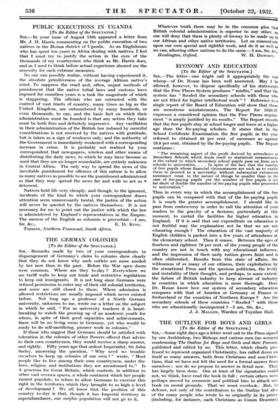ECONOMY AND EDUCATION - [To the Editor of the SPECTATOR.]
Sia,—The letter—one might call it appropriately the war whoop—of Dr. Rouse has been well answered. May I be allowed, however, to dispose specifically of- his statements that the Free Places System produces " misfits," and that the system has " flooded the secondary schools with those who are not fitted for higher intellectual work " ? Reference to a
single report of the Board of Education will show that these are monstrous misstatements. The Report for 1928-27 expresses a considered opinion that .the Free Places require. ment " is amply justified by its results." The Report records that the free pupils stay at school longer and leave at a higher age than the fee-paying scholars. It states that in the School Certificate Examination the free pupils in the year
referred to obtained 48 per cent. of successes as against 19.8 per cent. obtained by the fee-paying pupils. The Report continues : " The remaining aspect of the profit derived by attendance at Secondary Schools which lends itself to statistical measurement is the extent to which secondary. school pupils pass on from such schools to universities. . . . In spite of the fact that the number of free pupils whose financial circumstances are such as to enable them to proceed to a university without substantial extraneous assistance must in the nature of things be smaller than in the case of fee-paying pupils yet the number of free pupils is not far short of double the number of fee-paying pupils who proceeded to universities."
Thus in every way in which the accomplishment of the free pupils can be compared with that of the fee-paying pupils it is much the greater accomplishment. I should like to
pass from controversy in order to call the attention of your readers to the gravity of a decision, particularly at this
moment, to curtail the facilities for higher education in England. If it is said that our expenditure on education is not fruitful may the explanation not be that we are not educating enough ? The education of the vast majority of
English children is packed into a few years of attendance at the elementary school. Then it ceases. Between the ages of fourteen and eighteen 70 per cent. of the young people of the country are not in touch with any educational influence, and the- impression of their early tuition grows faint and is often obliterated. Results from this state of affairs, the witlessness of so many of our citizens, their exploitation by the sensational Press and the specious politician, the levity and instability of their thought, and perhaps, to some extent, the failure of British industry to keep abreast of industry in countries in which education is more thorough. Does
Dr. Rouse know how our system of secondary education compares with that of America or Germany or France or Switzerland or the countries of Northern Europe ? Are-the secondary schools of these countries " flooded " with those
who are educationally incompetent ?—I am, Sir, &c., J. J. Isfaumsr, Warden of Toynbee Hail.














































 Previous page
Previous page